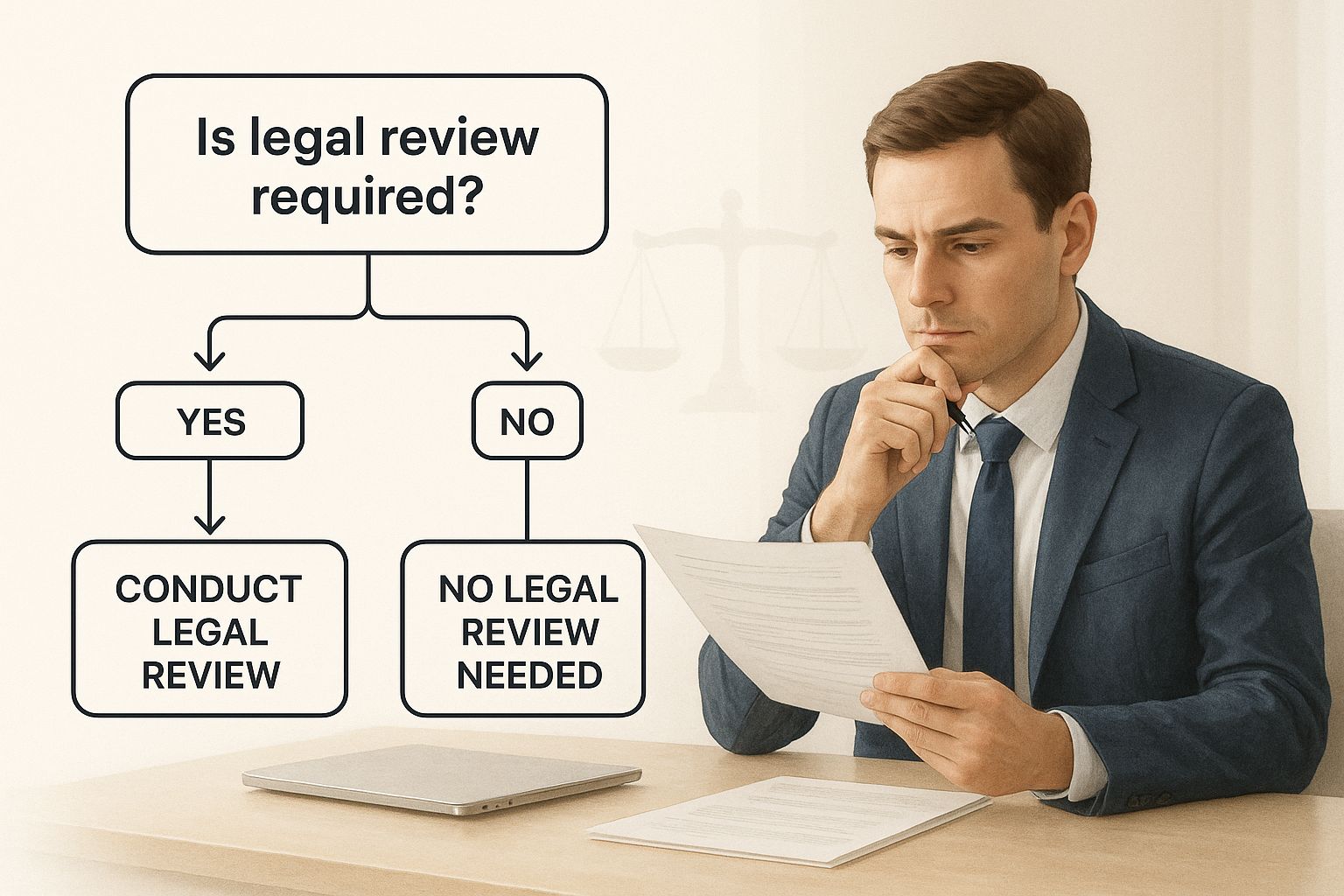Should You Sue Your Employer? Know Your Rights in Oregon
"I was satisfied once John Bell took over my case."
"Communication was always timely."
Should You Sue Your Employer? Know Your Rights in Oregon
Deciding whether to sue your employer is one of the toughest calls you’ll ever have to make professionally. There’s no easy answer here; the right move is completely unique to your situation. Taking legal action is a huge step with real consequences, and frankly, it's not always the best or only option on the table.
Is Suing Your Employer the Right Decision?
Choosing to sue your employer can feel like you're standing at a massive crossroads, and every path forward looks uncertain. This decision pulls in your career, your finances, and your mental health. The goal isn't just to lash out after a bad experience—it's about making a calculated, strategic choice that truly serves you in the long run.
This guide is designed to give you a balanced perspective, walking you through the critical things you need to weigh before you ever pick up the phone to call a lawyer. We'll get into the strength of your evidence, the actual harm you've suffered, and what you realistically hope to achieve.
Key Factors to Consider First
Before you get lost in the weeds of legal strategy, it's smart to do a quick gut check on your situation. Think about these initial questions to get a feel for where you stand:
- Was what happened actually illegal? This is the most important distinction to make. There’s a big difference between treatment that feels unfair and conduct that is actually against the law. For example, in Oregon, being fired for no specific reason is often perfectly legal, but being fired because of your race or gender is absolutely not.
- What do you really want to happen? Are you looking for a financial settlement? Do you want your job back? Or are you hoping to force a change in company policy so this doesn't happen to someone else? Having a clear goal is crucial for figuring out if a lawsuit is the right tool for the job.
- Do you have proof? A strong case is built on a foundation of solid evidence. We’re talking about things like emails, text messages, performance reviews, or statements from coworkers who saw what happened.
A Quick Checklist to See if a Lawsuit is Viable
To help you organize your thoughts, let's run through a quick self-assessment. This table isn't legal advice, but it can give you a clearer picture of whether you have the key ingredients for a potential case.
| Illegal Action | Was a specific law broken? | Being denied a promotion due to your age (age discrimination). |
| Provable Damages | Can you show you lost money or suffered harm? | You lost $50,000 in wages after being wrongfully fired. |
| Solid Evidence | Do you have more than just your word? | You have emails from a manager making inappropriate comments. |
| Clear Goal | What outcome are you aiming for? | Seeking back pay and a change in the company's harassment policy. |
Thinking through these points can help you move from feeling overwhelmed to having a more structured view of your circumstances.
Visualizing Your Path Forward
Sometimes a visual can help put things in perspective. This chart breaks down the decision-making process when you're thinking about taking legal action against an employer.

As the image shows, the road to a lawsuit isn't a straight line. It’s a journey that demands a careful look at your evidence and what you can realistically expect as an outcome.
If you were fired, it's also important to understand the full implications of job termination and what that means for your future. And for anyone dealing with harm that happened on the job, our guide on https://www.belllawoffices.com/injury-at-work-claims/ provides more specific and valuable insights.
Pinpointing Your Legal Grounds for a Lawsuit
We've all had bad days at work. A tough manager, a project that goes south, or just that feeling of being completely unappreciated—it's frustrating, but it isn't always illegal. The absolute first step in this process is figuring out the difference between what feels unfair and what is actually against the law. For a lawsuit to have any chance of success, it has to be built on a solid legal foundation, not just a bad experience.
Think of it this way: your sense of being wronged is the emotional fuel, but the law is the engine. Without that engine, you’re not going anywhere. Both Oregon and federal laws are very specific about what employers can and cannot do.
Unfair vs. Unlawful: The Critical Distinction
Oregon is an "at-will" employment state. This is a concept that trips a lot of people up. It essentially means an employer can fire you for any reason—or even no reason at all—as long as that reason isn't illegal.
Getting fired because your boss just doesn't like your personality? That feels incredibly unfair, but it's probably not against the law. An unlawful action, on the other hand, is one that breaks a specific rule, whether it's a state statute or a fundamental public policy. Those are the actions that can support a real lawsuit.
The heart of any strong employment case is proving your employer’s actions weren't just bad management, but a clear violation of your legally protected rights.
Common Legal Grounds to Sue Your Employer
So, what does an illegal action actually look like? Let's break down the most common reasons someone might have a legitimate case against their employer in Oregon.
- Wrongful Termination: This is when you're fired for an illegal reason. Maybe you were let go right after you filed a workers' comp claim or reported a serious safety violation to OSHA. Firing someone as punishment for exercising a legal right is the textbook definition of wrongful termination.
- Workplace Discrimination: This happens when your employer makes a negative decision about your job—like firing you, demoting you, or passing you over for a promotion—specifically because you belong to a protected class. These classes include your race, gender, age (if you're over 40), religion, disability, or sexual orientation. If you notice a pattern of younger, less-experienced people getting promotions you were qualified for, that could be a red flag for age discrimination.
- Workplace Harassment: Harassment crosses the line into illegal territory when it's so severe or happens so often that it creates a "hostile work environment." This isn't about a coworker making one-off rude comment. We're talking about a persistent pattern of offensive behavior—like constant racial slurs or unwelcome sexual advances—that makes it nearly impossible to do your job. The key is that the harassment is tied to your protected status.
- Wage and Hour Violations: These are some of the most clear-cut cases. Did your employer fail to pay you for every hour you worked? Are they refusing to pay you the proper overtime rate? Or are they taking illegal deductions from your paycheck? That's potential wage theft, and you absolutely have grounds to take action.
Look at your own experience through this lens. If what happened to you fits squarely into one of these categories, you might just have the legal grounds you need to move forward.
Taking the Critical First Steps Before Filing a Lawsuit
Realizing you might have to sue your employer is a heavy moment. But as tempting as it is to charge ahead, hitting the brakes and preparing carefully is the smartest move you can make. Think of it like building a house—if you don't pour a solid foundation, the whole thing is likely to come crashing down later. These early steps aren't just about checking boxes; they're about protecting yourself and building a case that can actually win.

The best weapon you have in your corner is documentation. Memories get fuzzy and details get lost, but a written record speaks for itself. Getting everything organized right from the start can be the single most important factor in whether your claim succeeds or fails.
Collect Every Piece of Evidence
The first thing to do is start a private, secure file of every document and message related to your situation. Whatever you do, don't keep this on a company-owned computer or phone. Your mission is to build an undeniable timeline of what happened.
- Emails and Messages: Hunt down and save every relevant email, text, or Slack message. This includes your back-and-forth with your boss, HR, and even coworkers.
- Performance Reviews: Official reviews are gold, especially if they were positive before the trouble started. They can completely shut down a company's later claims that you were a poor performer.
- Personal Notes: Keep a journal. It doesn’t have to be fancy. After any important conversation or incident, jot down the date, time, who was there, and a play-by-play of what was said and done.
- Official Documents: When you've been fired, understanding termination and relieving letters is crucial, as these papers often contain key details. Gather them up.
If your case involves any kind of physical injury or emotional distress, getting your medical information in order is also a must. We have a helpful guide on https://www.belllawoffices.com/how-to-get-medical-records/ that walks you through that process.
Report the Issue Internally
Before you take your fight public, you almost always need to go through your company's official channels first. That usually means a formal report to the Human Resources department. This step is non-negotiable because it shows you gave your employer a fair chance to make things right. Skipping it can seriously damage your case down the road.
By reporting internally, you put the company on the spot. Either they fix the problem, or you get a paper trail of their refusal to act. Both of those outcomes make your case stronger.
File a Complaint with the Right Agency
Finally, before a lawsuit can even begin, you typically have to file a formal complaint with a government agency. For employment issues in Oregon, that’s usually the Bureau of Labor and Industries (BOLI) or the federal Equal Employment Opportunity Commission (EEOC).
This is a mandatory prerequisite for most employment lawsuits. These agencies will conduct their own investigation, and sometimes, their involvement is enough to get a resolution without ever setting foot in a courtroom. It's a vital step, especially when you consider that a recent report showed workers' access to justice is restricted in 72% of countries worldwide.
Weighing the True Costs and Benefits of Legal Action
Deciding whether to sue your employer is a tough call. It's not just about whether you were wronged; it’s about making a strategic decision. You have to be brutally honest with yourself: is the potential reward worth the fight ahead?
This isn't a simple math problem. You need to look beyond a potential settlement check and consider every angle—the financial, the emotional, and the professional—before diving in.
The Emotional and Financial Toll
Let's talk about the costs, because they're very real. Many Oregon employment lawyers work on a contingency basis, which is great. It means you don’t pay them unless you win. But don't mistake that for a "free" lawsuit.
There are still other expenses to think about, like court filing fees, paying for expert witnesses, or the cost of deposition transcripts. On top of that, you have to account for lost wages from taking time off for meetings with your attorney, depositions, and potential court dates.
Honestly, though, the non-financial toll is often what hits people the hardest. A lawsuit is a marathon, not a sprint. It can drag on for months, or even years, creating a huge amount of stress that can strain your mental health and even your relationships.
Litigation is, by its very nature, an adversarial process. It’s draining. Be prepared for your professional history and personal life to be put under a microscope, which can feel incredibly invasive. That long, drawn-out period of conflict is a heavy weight to carry, so having a good support system is non-negotiable.
Potential Upside of Taking Legal Action
Now for the other side of the coin. The potential benefits of a successful lawsuit can be life-changing. The most obvious win is, of course, financial compensation.
A successful claim can help you recover damages for things like:
- Back Pay: The wages, bonuses, and benefits you should have earned from the time of the illegal action up to the resolution of your case.
- Front Pay: Money to cover your future lost earnings if getting your job back isn't a realistic option.
- Emotional Distress: Compensation for the very real anxiety, sleepless nights, and mental anguish you've gone through.
But it’s not always just about the money. A lawsuit can bring about powerful, non-financial victories. You might get your job back (reinstatement). More importantly for some, it’s a way to hold your employer accountable and force them to change their ways. Your courage could prevent someone else from going through the same thing.
A lawsuit can provide a profound sense of justice. For many, this validation and the knowledge that they stood up for their rights is the most meaningful outcome of all.
Cost vs Benefit Analysis of Suing Your Employer
To help you see the full picture, this table breaks down the potential pros and cons you should consider.
| Financial Compensation: Recover lost wages, benefits, and future earnings. | Financial Strain: Court fees, expert witness costs, and lost income from time off. |
| Justice and Validation: A formal acknowledgment that you were wronged. | Emotional Toll: High levels of stress, anxiety, and pressure on you and your family. |
| Reinstatement: The possibility of getting your old job back. | Time Commitment: The legal process is slow and can take months or even years. |
| Accountability: Holding the employer responsible for their actions. | Invasive Process: Your work history and personal life may be scrutinized. |
| Systemic Change: Forcing policy changes that protect future employees. | Professional Risk: Potential damage to your reputation or future job prospects. |
| Closure: A sense of finality and the ability to move forward. | Uncertain Outcome: There's no guarantee you will win your case. |
Ultimately, weighing these factors is a deeply personal process. Taking a hard, realistic look at the financial, emotional, and practical trade-offs is the only way to decide if a lawsuit is the right move for you.
Navigating Oregon's Legal Deadlines and Rules

Here's a hard truth: your legal rights have an expiration date. In the legal world, this is called the statute of limitations, and it's essentially a ticking clock on your ability to file a lawsuit. If you let that clock run out, you could lose your right to sue entirely, no matter how solid your case is.
Understanding these deadlines is non-negotiable. For most employment-related issues in Oregon, like discrimination or wrongful termination, the first step is filing a complaint with the Bureau of Labor and Industries (BOLI). The clock is tight—you generally have just 365 days from the day the illegal act occurred to get your complaint filed.
A year might sound like a long time, but it flies by when you're dealing with the stress of a job loss, trying to gather documents, and figuring out your next move. Waiting too long is one of the most common and heartbreaking mistakes we see.
The Special Case of Workplace Injuries
Things get a bit more complicated when you're hurt on the job. A lot of people naturally wonder if they can sue their employer for an injury, but Oregon's system is set up to handle this differently. It all comes down to what’s known as the "exclusive remedy rule."
This rule basically says that the workers' compensation system is your only path for getting compensated for a workplace injury. You get benefits for medical bills and lost wages without having to prove your employer did anything wrong, but in exchange, you generally cannot sue your employer for the injury.
But like many legal rules, this one has a few critical exceptions.
- Intentional Harm: If you can prove your employer intentionally hurt you, the door to a lawsuit might open. This isn't about negligence or carelessness; you have to show they deliberately intended to cause harm, which is a very high standard to meet.
- Third-Party Negligence: What if your injury was caused by someone who wasn't your employer or a direct coworker? Maybe a subcontractor on a construction site made a mistake, or a piece of equipment from another company was defective. In those cases, you can often file a personal injury lawsuit against that "third party."
It’s crucial to see the difference here. While you're barred from suing your boss for an accidental injury, you might have a perfectly valid case against another person or company whose negligence got you hurt.
This third-party lawsuit is a completely separate process from your workers' comp claim. It also allows you to recover damages for things like pain and suffering, which workers' comp simply doesn't cover. Because these rules are so complex and the deadlines are unforgiving, the best thing you can do is act quickly to protect your options.
Finding the Right Employment Lawyer in Oregon
Deciding to sue your employer is a massive step. But trying to go it alone in the legal world? That's like trying to perform your own surgery—it’s incredibly risky, and the results are almost never what you hoped for.
Finding the right lawyer isn't just a box to check; it’s the single most important strategic move you can make. This one choice can easily mean the difference between a successful claim and a frustrating, uphill battle that goes nowhere. Think of your attorney as more than just a legal expert. They're your strategist, your advocate, and your guide through a system that can feel intentionally confusing.
Where to Start Your Search
You don't have to feel lost when looking for a qualified employment lawyer in Oregon. The key is to start with reputable sources that have already done some of the vetting for you.
- Oregon State Bar Referral Service: This is always a solid, reliable place to begin. The state bar can put you in touch with licensed attorneys in your area who specifically handle employment law.
- Legal Aid Services: If your income is limited, organizations like Legal Aid Services of Oregon are a fantastic resource. They often provide free or low-cost legal help for certain types of employment issues.
- Reputable Online Directories: Websites like Avvo, Martindale-Hubbell, and Super Lawyers are also useful tools. They offer profiles, client reviews, and ratings from other lawyers, helping you build a solid shortlist of candidates.
It's worth noting that taking legal action against an employer is becoming more common. One recent litigation trends survey revealed that employment and labor disputes are a major driver of class action lawsuits. In fact, nearly 24% of corporate lawyers reported being involved in one just in the past year. You can dig into more of the data in the 2025 Annual Litigation Trends Survey to see the bigger picture.
Questions to Ask During a Consultation
Once you have a few names, it's time to schedule initial consultations. Many lawyers offer these for free, and this is your opportunity to interview them. You need to get a feel for their expertise, their communication style, and whether they're the right fit for you and your case.
A good consultation should feel like a two-way conversation. You are evaluating them just as much as they are evaluating your case.
Don't go in empty-handed. Prepare a list of questions to help you make an informed decision:
What percentage of your practice is focused on employment law cases like mine? You want a specialist, not a generalist.
What’s your track record with cases involving [wrongful termination, discrimination, etc.] specifically in Oregon?
How do you handle your fees? Do you work on contingency?
From what you've heard so far, what’s your honest take on my case’s strengths and weaknesses?
If I hire you, who will be my main point of contact, and what’s your process for keeping clients updated?
Picking the right legal advocate is the foundation of your case, and the same core principles apply to other areas of law. For more great tips, you can also read our guide on how to choose a personal injury attorney.
Common Questions About Suing Your Employer
When you're thinking about suing your employer, a flood of practical, urgent questions naturally comes to mind. Getting straight answers is the first step toward making a sound decision and understanding what this path actually involves.
Let's tackle some of the most common concerns right away.
Can I Be Fired for Suing My Employer?
This is often the biggest fear, but the law is firmly on your side. The short answer is no. It is illegal for an employer to fire you for filing a legitimate lawsuit or a formal complaint with a government agency like Oregon's BOLI or the federal EEOC.
That kind of behavior is called retaliation, and it’s a serious violation that can actually create a brand-new, often stronger, legal claim against the company. These protections are in place precisely so you can stand up for your rights without the fear of being punished for it.
What Does an Employment Lawyer Cost?
The cost is another major roadblock for most people, but it’s probably not what you think. Most employment lawyers in Oregon handle these cases on a contingency fee basis.
What does that mean for you? You pay nothing out of pocket for their time and legal work.
A contingency agreement is simple: your lawyer only gets paid if they win your case, either by negotiating a settlement or winning a verdict in court. Their fee is just a percentage of the final amount you receive, typically somewhere between 30% and 40%.
When you have your first consultation, it's a good idea to ask about other potential expenses, like court filing fees, so you have a complete picture.
What If I Signed an Arbitration Agreement?
It's becoming more and more common for companies to have employees sign arbitration agreements as a condition of employment. Essentially, this is a contract where you may have agreed to give up your right to a traditional lawsuit. Instead, your dispute would be settled out of court through a private process called arbitration.
But don't assume your case is over before it starts. These agreements aren't always airtight. A skilled employment lawyer can review the specific document you signed to see if it’s even legally enforceable in Oregon and figure out the best way to move forward.
Navigating the complexities of an employment dispute requires expert guidance. The team at Bell Law is dedicated to protecting the rights of Oregon workers. If you believe you have been wronged by an employer, contact us for a consultation to understand your legal options.
Disclaimer: The information on this page is provided for general informational purposes only and is not legal advice. Reading this content does not create an attorney-client relationship. For advice about your specific situation, please contact a licensed attorney.







